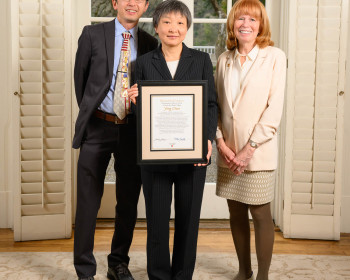International Environmental Law Clinic Triggers Action on Japan’s Whale Meat Trade
Open gallery

This is an update to the story which first appeared December 2017.
The International Environmental Law Project (IELP) at Lewis & Clark Law School prepared a legal opinion that helped trigger an international regulatory decision demanding that Japan take immediate remedial action to stop importing the meat of sei whales.
This is the first time that a developed country has been found to violate CITES.
Based on IELP’s legal opinion and other information, the Convention on International Trade in Endangered Species (CITES) investigated Japan’s trade in sei whales last fall.
On October 2, 2018, the Standing Committee of CITES agreed that the trade (in whale meat and blubber) of sei whales from the North Pacific population violated the rules of CITES. They recommended that “Japan take immediate remedial action to comply.
Several national and international media publications covered this, including the Washington Post and Independent.
Over the last two years, IELP has been working with its clients to pursue a finding of noncompliance by Japan with respect to its commercial trade in the meat of sei whales.
At the 2017 CITES meeting in Geneva, Law Professor Erica Lyman and LLM student and IELP Fellow Olivier Jamin argued that Japan is violating CITES by importing sei whale meat for commercial sale.
“Japan kills up to134 sei whales each year on the high seas in the North Pacific as part of its scientific whaling program,” said Lyman. “However, the vast majority of the whale —about 12 tons of each whale—is imported for commercial purposes, primarily as food.”
These are conclusions based on evidence drawn directly from government documents that state that the primary goal of commercial whale meat sales is to generate income to support future whaling endeavors. IELP’s legal opinion can be found here.
Sei whales were decimated by commercial whaling in the 1800s and early 1900s and are now listed as “threatened with extinction” by CITES, which affords them the highest level of trade protection—they may not be imported or introduced from high seas areas for “primarily commercial purposes.” This prohibition gives effect to the central objective of CITES—to prevent overexploitation of species due to trade.
IELP is an environmental law clinic that trains and educates the next generation of international environmental advocates through classroom instruction, representation of clients, and hands-on participation at international environmental treaty negotiations. The IELP contracts with governments, non-governmental organizations, and international institutions to develop, implement, and enforce international environmental law, tackling some of today’s most challenging global issues.
Law Communications is located in room 304 of Legal Research Center (LRC) on the law Campus.
MSC: 51
email jasbury@lclark.edu
voice 503-768-6605
Cell: 626-676-7923
Assistant Dean,
Communications and External Relations, Law School
Judy Asbury
Law Communications
Lewis & Clark Law School
10101 S. Terwilliger Boulevard MSC 51
Portland OR 97219

